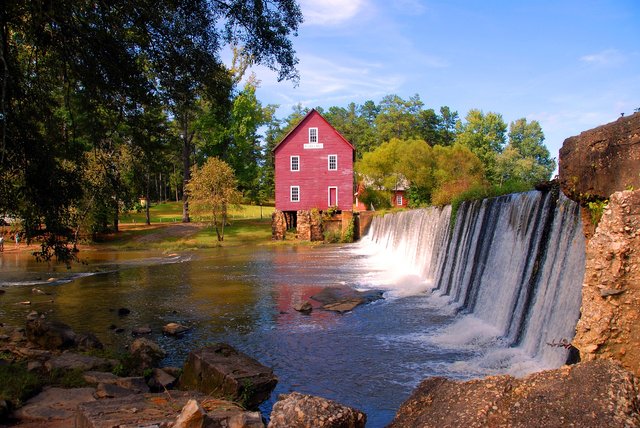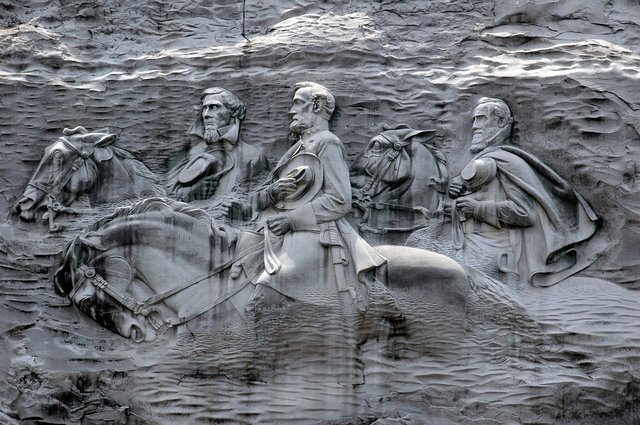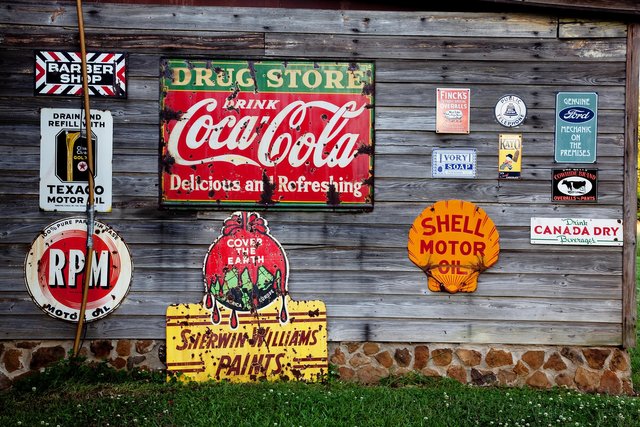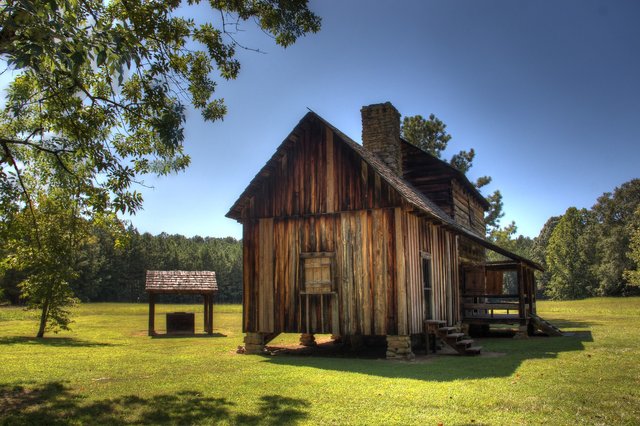Adsactly Education - Georgia History Continued
Adsactly Education: Georgia History Continued
Georgia
The Peach State
Capital: Atlanta
Largest City: Atlanta
59,424 sq. mi. 153,909 sq. Km
24th Largest State
Admitted to US: 1788 (4th)
Population: 11,000,000 (8th)
Highest Point: 4,784 ft (1,458 m)
Lowest Point: Sea Level
State Bird: Brown Thrasher
State Flower: Cherokee Rose
Motto: Wisdom, Justice, Moderation
Bordered By: Tennessee, North Carolina, South Carolina, Florida, Alabama, Atlantic Ocean.
Post Reconstruction
The years between Reconstruction and the dawn of the 20th Century were tumultuous to say the least. Georgia became a leader of the Jim Crow movement and brutally suppressed the black population. Lynchings became commonplace and the Jim Crow laws repressed the blacks in all areas. The KKK rose to prominence and dominated much of the state.
Into all this came a new, industrial attitude that was based on cotton, mining and logging to start, then paper products and ceramic pipe and textiles. Georgia was becoming the industrial heart of the old south. Much of the profit and expertise was gained by very cheap labor (black and white) and a ‘prisoner lease’ that allowed companies to ‘lease’ prisoners from the state and not pay them a thing while they served out their sentence. The state and the businesses both profited greatly from this practice.
In the midst of all the tumult Fulton County (Atlanta) became a dry county. In 1885 an obscure pharmacist in Atlanta invented a new soft drink. Coca-Cola was born. It would become Georgia’s most famous product.
Towards the end of the 19th Century Booker T. Washington (a black man) urged black to not agitate for full social equality but rather make themselves of value in service to the white population. The few educated blacks in Georgia disagreed.
By the twentieth century Georgia had become a single party state which excluded blacks from holding political office and almost entirely excluded them from voting. Poor whites were also excluded from voting in large numbers, so the party and the process rolled on and on. It would really take the second world war to start the social changes that would occur in Georgia.
It would take the fall of King Cotton to bring about change. By the 1890s the cotton price had fallen to less than the cost of production. Formerly wealthy white planters along with black and white sharecroppers were in debt to and held prisoner by the suppliers. The only way to quit once you owed them money was to walk away from all the work and capital you had invested.
Which led to the rise of the ‘Grange’ movement and the Populist party which urged all farmers to band together to raise the whole industry, not just individuals. It took time and some severe economic hardship, but the two groups finally had something they could agree on with a passion. It wouldn’t last, but the hopefulness that these two things provided would lead to changes.
The 20th Century dawned with conditions for Cotton farmers and menial workers no better than it had been in the 19th. Jim Crow was still the law, and white workers were sorely abused also. There was no public secondary education in Georgia until the early 1900s and then it was ‘white only’.
The 20th Century
By 1915 Georgia was officially a ‘dry’ state. Smuggling from neighboring states and particularly ‘moonshining’ became common place. Into the void of social drinking stepped Coca-Cola. The rise in popularity was phenomenal during prohibition was incredible and it kept growing first as a ‘local brand’ and later as a national brand.
WWI was mostly kind to Georgia. Cotton prices rose dramatically, and military needs spurred the production of turpentine and paper. Jobs were plentiful and education was starting to become widespread. The social progress during WWI became the basis for a huge middle class in Georgia.
Blacks migrated to northern and western industrial areas in huge numbers. Many of them found success and became part of the middle class in a single generation.
The end of WWI caused a recession in Georgia, and it lingered on into the Great Depression of the 1930s. Times were tough. The Federal Government poured a lot of recovery money into the state, and the CCC employed thousands and the Agriculture Adjustment Act paid Cotton Farmers to plant less cotton. The New Deal was responsible for keeping Georgia afloat and Franklin Roosevelt moved the ‘alternative’ Capitol to Warm Springs, GA.
WWII officially marked the end of the depression in Georgia. Lured by cheap and plentiful labor over 500 factories opened in Georgia during the war. Urban areas prospered and people moved to urban areas to take advantage of it. For the most part the prosperity in the cities continued to grow long after the war.
Civil Rights
The history of the Civil Rights movement in the US certainly passes through Georgia. It was one of the most brutal of the Jim Crow states, and probably the first place in the deep south that offered some relief to that fact.
Blacks returning from (segregated) service in WWII and an emerging educated black middle class in urban Georgia combined to start the push for the constitutionally promised ‘equal rights’. Martin Luther King who was born in Atlanta and educated in Boston became one of the early national leaders of the movement. Boycotts and demonstrations across the south brought the attention of the entire nation and with it, the desire for change.
John F. Kennedy was a huge advocate of Civil Rights and as President set up a series of bills designed to eliminate discrimination on a national level. After his assassination in 1963 his Vice President, Lyndon Johnson, rammed the bills through Congress. The Civil Rights act of 1964 and the Voting Rights Act of 1965 guaranteed those rights.
Not that the transition went smoothly. Local politicians detested the laws, and fought in every imaginable way to keep them from being implemented. It wasn’t until the election of Jimmy Carter to governor of Georgia and later as President of the US that the promise was fulfilled.
The result of all the turmoil and heartache had one unintended consequence that no one foresaw. That would be the economic explosion that would happen in Georgia and make it one of the leading lights in the ‘old south’ and the entire nation. We will discuss this ‘economic miracle’ further in the next installment on the state of Georgia.
Dumb Laws
It is illegal to use profanity in front of a dead body which lies in a funeral home or in a coroners office.
Members of the state assembly cannot be ticketed for speeding while the state assembly is in session.
All images in this post are properly licensed and used.
This is part of a series on the various states. We will finish up Georgia in the next instalment, I hope you will return. I do hope you have enjoyed this synpsis of Georgia. The words and ideas are mine but I used Wikipedia Georgia as the source for the information.
Authored by: @bigtom13
Click on the coin to join our Discord Chat

Witness proposal is here:
Go To Steem Witness Page
In the bottom of the page type: adsactly-witness and press vote.

Use small letters and no "@" sign. Or, click here to vote directly!
Thank you!




An excellent continuation about Georgia, it is regrettable to know the times of discrimination that lived in that territory, but glad to know that they were overcome. Again the silly laws make me very funny, who can think of such things? Hahaha! The images selected to accompany this publication are wonderful. I look forward to your next post, @bigtom13. Thank you, @adsactly for sharing this interesting publication.
Thank you. The discrimination was brutal and systemic, yet when it broke down it really broke down in Georgia. It's truly an amazing story.
This second issue of his article on Geordia, @bigtom13, demonstrates the complicated reality of racial discrimination in that state and how it was formed is a movement in rejection of it. Thanks to that movement and to the existence of native leaders such as Martin Luther King, and progressive presidents such as Keneddy and Carter, that state was able to get out of such a condition of civil backwardness in Human Rights. Progress that hopefully will be maintained, but there have been recent manifestations of a return to racist attitudes.
I did not know that Coca-Cola was born in Georgia.
Thanks to its organized and accurate information, we complement our knowledge of basic issues. Attentive to your new work. Greetings.
There are still manifestations of the former discrimination but it really changed radically in Georgia. Some of the vestiges will be worn down with time, of that I have no doubt. Legislation can only go so far, at some point it is up to the people to change their attitudes.
I'm a fellow Georgian and enjoyed seeing Stars Mill as one of your images. The outline seems to be narrowly focused on particular ideological issues relative to our current intersectional culture war.
Georgia has a lot to offer than some of the stereotypical topics covered in your outline.
I am treading oh so carefully with this. From my perspective, Georgia was at least as bad as any of the 'Deep South' states in how they treated minorities (blacks particularly) but as I have hinted they really lead the way today. I'll cover that part in the 'economy' section of the next installment. The change was fairly quick and the impact was incredible.
Who was Jim Crow? A governor, an important person? Why Jim Crow laws? As I told you before, I had heard and read a lot about Georgia's repressive history from the novel Gone with the Wind, but your summary makes it clearer to me the magnitude of discrimination. I wouldn't have liked to live in Georgia! I didn't know about Cocacola either. That is a fact that is very important to know and that I will remember from now on. What I will surely forget for stupid, the law, not me, is to say bad words in front of a dead person. Could it be that the dead can hear us and be offended? Silly laws that make me laugh. I will wait for the next delivery of Georgia. Greetings, @bigtom13.
Ahhhhh Nancy. I apologize. Jim Crow was the name applied to the repressive laws that started being passed just after the Civil War. It is a really broad term for quite a specific situation. It is essentially any law or practice that prohibits a group of people from enjoying the same rights as another group. I first learned to hate the term as applied to baseball. The Negro league was commonly called the Jim Crow league. It was just an awful time in our country.
I do believe I may have violated that law a time or two. Glad I didn't live in Georgia at the time...
Dein Beitrag hat mir sehr gefallen! Du hast ein Upvote von @zakura erhalten.
Thank you. I have a very small German background, but I had to run it through Google Translate to be sure.
Thank you, @bigtom13, for this second part, narrated and explained with great agility. I thought it was very dynamic the way you point out the events that meant important changes for the socioproductive and political configuration of the state.
I found it extremely interesting that the war was "beneficial" in a way for those who had traditionally been disadvantaged and not for the magnates and coyotes who often benefit from catastrophic events.
In my country, history tends to be much more rigidly portrayed, so I enjoyed your text.
The selection of photographs is very beautiful.
The bosses made their money too, but opening all those factories to what would soon be good paying jobs had an enormous effect on the economy AND the society.
Wow. This was quite a comprehensive post. Thank you for this glimpse into Georgians history
Posted using Partiko Android
Thank you for the kind words. I appreciate it.
Hi, @adsactly!
You just got a 0.46% upvote from SteemPlus!
To get higher upvotes, earn more SteemPlus Points (SPP). On your Steemit wallet, check your SPP balance and click on "How to earn SPP?" to find out all the ways to earn.
If you're not using SteemPlus yet, please check our last posts in here to see the many ways in which SteemPlus can improve your Steem experience on Steemit and Busy.
History is a milestone that we must recognize. As a person outside America I know about Georgia. You describe in detail like a teacher who is giving a lesson and we can follow it clearly. we become the ins and outs of the year and its development from the past to the present.
thank you @bigtom13
Thank you @adsactly
thank you steemit
Warm regard from Indonesia